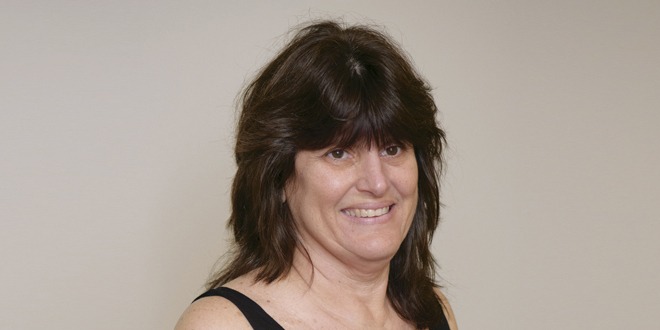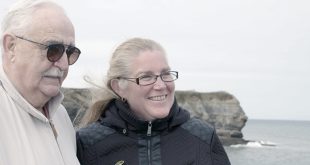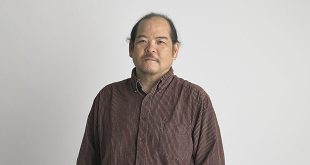People with type 2 diabetes write back to their younger selves, to share personal insights and reflect on their experience of living with diabetes and starting on insulin therapy. In this post, Kathleen reflects on living with diabetes.
Everyone who knows Kathleen, is pretty sure she can handle anything. As a mother and a high school secretary living in Croydon, Pennsylvania, USA, Kathleen has been on the go, successfully doing it all, for as long as she can remember. Here’s a woman who purposefully dispatches the business of life and work, and isn’t one to admit to difficulties.
So, it was a shock when her husband Tom and her kids discovered four years ago that she was going blind in her left eye. Diagnosed with type 2 diabetes at 40, she had added insulin to her treatment plan at 45. But she was neglectful about managing the condition, even though her mother had died from diabetes-related heart failure at age 67.
“I was not being aware, not testing my blood sugar, not making sure I was eating right. I was in denial, acting like I didn’t have anything wrong with me,” she explains. As her eyesight failed in her left eye, she told no one. It was scary but it was gradual. At last, when she needed to have a procedure on the eye, she was forced to tell her family. Unfortunately, the procedure was unsuccessful and Kathleen went blind in that eye.
As traumatic as that must have been, Kathleen continued to be in denial about her diabetes and its consequences – until November 2016, when she was 53 years old and going shopping on the Friday before Thanksgiving with her sister, Deb. This is always one of her favourite days of the year. As the day went on and she began to have trouble reading price tags, she started to panic.
Almost as bad as the eyesight leaking away was the fact that Kathleen knew she would be unable to keep this development a secret. Kathleen had laser eye surgery and an injection in her eye, which successfully restored her sight. But the six weeks of healing, during which she could not see properly, were like torture for her. She had to rely on her family, friends and co-workers for assistance on a daily basis. She needed support at work to do her job. She couldn’t drive. She could barely see to read or write. Her husband, who was accustomed to a strong, take-charge partner, had to pitch in with everything from cooking to cleaning. One of the worst occasions was that she couldn’t see her children’s expressions on Christmas morning that year.
And yet it was the wake-up call Kathleen finally heeded. She has become much more vigilant with eating, exercise, blood sugar testing and insulin injections. The experience has changed her husband too. He’s lost 27 kilograms through exercise and a change in eating habits. “In his mind, if he loses weight, then I’m doing better too,” says Kathleen.
Still, she now wishes she had avoided the physical toll diabetes has taken. Now 53, she chose to write a letter to herself at 30, when she had gestational diabetes.
Dear Kathleen,
Your doctor just told you that you have gestational diabetes. It’s a reality check. Learn from this. Decide now to take care of yourself and your diabetes. Don’t do it only when you are pregnant. You will have beautiful healthy babies because you will make sure you do everything you can to protect them. Now it is time to do everything you can to protect and care for your health.
So here is my advice to you. Don’t ignore this experience. Don’t deny the factors that contribute to diabetes, such as weight gain, and the things you must do when you have diabetes: check your blood sugar levels on a daily basis. No one will judge you. Exercise. You do it now, but as you get older you will want to slow down. At 53, I hate exercise. But if you keep it a part of your everyday life, you will definitely thank me!
Eat healthier for yourself, for Tom and the kids. It’s better for them. It will help them and hopefully they will have less of a struggle than you have.
Here’s the most important thing you can do that will help you with all of the other habits: change your mindset. Your whole idea of yourself is built on being so capable that you don’t ever need help. So down the road, when you are diagnosed with type 2 diabetes, you won’t want to believe it. You see it as a vulnerability – and being vulnerable is the last thing you want in your life.
Instead of thinking about it as a weakness, think about it as a way to focus some of your powerful competence on yourself. Think of testing your blood sugar, exercising, eating right – and when the time comes, taking insulin – as activities you can probably do more efficiently and effectively than most people.
Doing this could save you from a devastating physical loss. Your babies will grow up to be amazing people and you want to be there to experience all of the joys and sorrows with them. You want to be able to see them open their presents on Christmas morning because, let me tell you, not being able to see their faces light up on Christmas day is not fun. You would not like being dependent.
The future is bright. You will have your ups and downs but if you take care of this early, you will be able to live with diabetes and help yourself and your family to be healthier!
Your can-do future self,
Kathleen
This story has been edited by Ellyn Spragins and shared with support from Novo Nordisk Canada. The views and opinions expressed are not representative of Novo Nordisk, and should not be considered treatment advice. Novo Nordisk has permission to share this letter and included personal details.
 Diabetes Care Community Learn, connect and care
Diabetes Care Community Learn, connect and care




